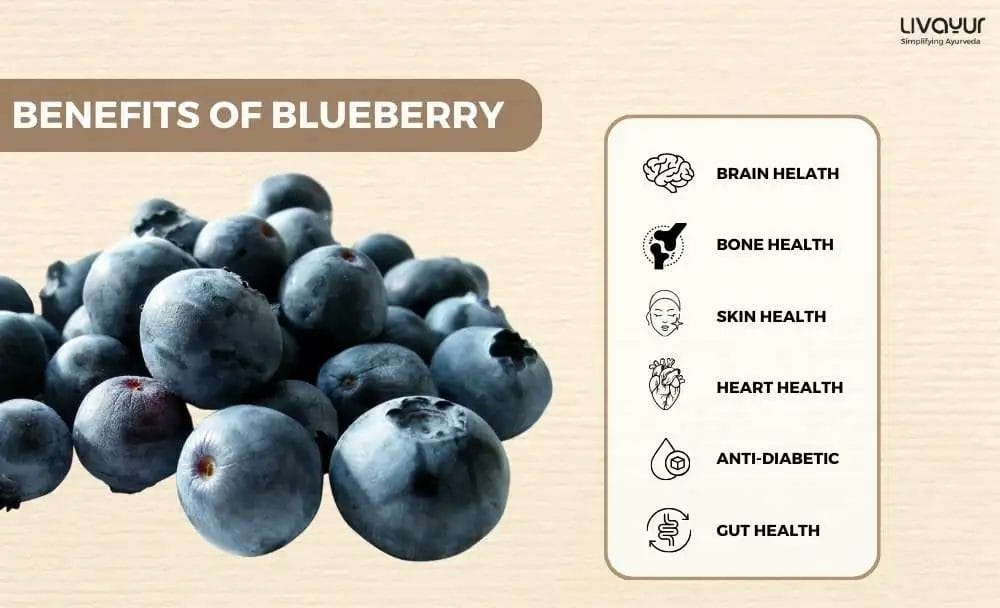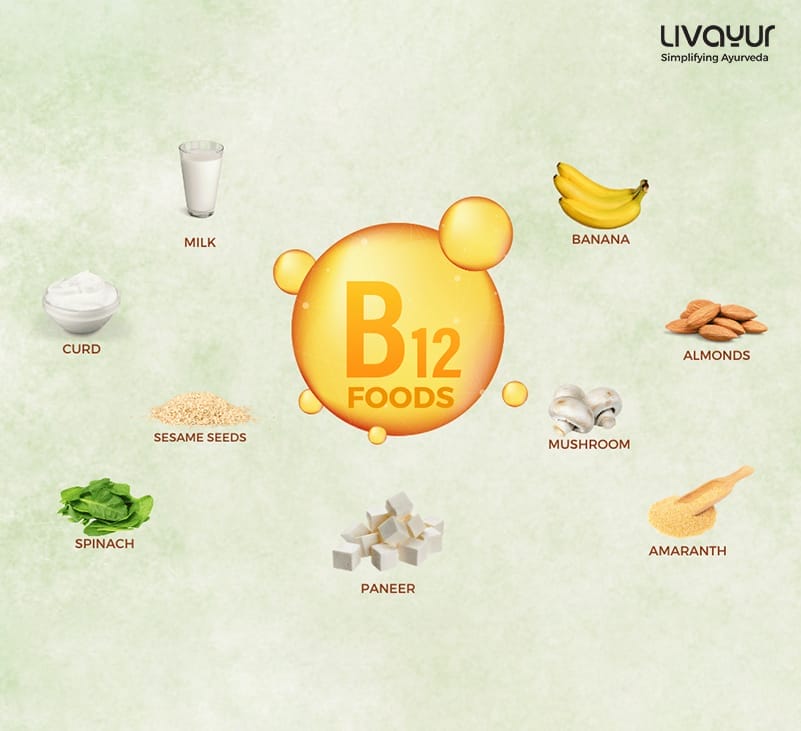
Blueberries are among the healthiest of foods and they truly deserve their reputation as a superfood. These tiny berries are refreshingly sweet and tangy, with a delectable flavor that will leave you wanting more. The blueberry fruit is not native to India and is only cultivated in some of the northern states, so it can be a bit pricey and exotic for most of us. Nevertheless, these berries are well worth the price because they are packed with antioxidants and vitamins. Blueberry benefits are widely recognized in numerous scientific studies. In this article, we will learn about the benefits of blueberries, the nutritional value and properties of blueberries, the blueberry uses, some amazing recipes with blueberries, and more. Read on:
Nutritional Value of Blueberries
1 cup of blueberries can provide you with the following nutrients. The table below shows the different values of each nutrient in blueberry:
| Nutrients | Values |
| Calories | 84 Kcal |
| Sugar | 15 g |
| Carbohydrates | 21 g |
| Fat | 0.5 g |
| Protein | 1 g |
| Fiber | 3.6 g |
| Sodium | 1.5 mg |
| Vitamin B6 | 0.1 mg |
| Vitamin E | 0.8 mg |
| Vitamin C | 14.4 mg |
| Vitamin K | 28.6 mcg |
Nutritional and Therapeutic Properties of Blueberries [1]
The nutritional and therapeutic properties of blueberry are given below:
- Antioxidant properties
- Anti-inflammatory properties
- Anti-cancer properties
- Cholesterol-lowering properties
- Cardioprotective properties
- Neuroprotective properties
- Glucoregulatory properties
- Anti-aging properties
- Antimicrobial properties
Blueberry Benefits for Health
1. Supports Brain Health
Some of the most notable blueberry fruit benefits are linked to their flavonoids, which are known to boost brain function. According to research in The American Journal of Clinical Nutrition, a high intake of such flavonoids can lower the risk of Alzheimer’s by as much as 40 percent. [1]
2. Boosts Your Mood
There is some evidence showing that children and young adults who consume blueberry juice regularly have a reduced risk of depression. One study even suggests that blueberry consumption may relieve symptoms of PTSD.
3. Strengthens Your Bones
The blueberry fruit is a healthy addition to anyone’s diet, but it’s particularly good for women who are at risk of osteoporosis after menopause. That’s because the fruit is rich in manganese, an essential mineral for healthy bones. Research also shows that blueberry consumption lowers the risk of osteopenia or low bone density. [3]
4. Promotes Skin Health
Like most berries, blueberries are a good source of vitamin C, with a single cup giving you 24 percent of your required daily intake. This nutrient isn’t just good for your immunity, it is also needed for collagen production that protects your skin and limits the effects of aging. [2]
5. Aids in Weight Loss
Low in calories and high in nutrition, blueberries are a great way to satiate your taste buds and fill up with fiber. This reduces the risk of overeating and food cravings. Additionally, some studies suggest that a high intake of anthocyanins like those in blueberries is linked to lower body fat content. [1]
6. Lowers Blood Pressure
Blood pressure is a public health threat in India, increasing the risk of heart attacks, stroke, kidney disease, and other complications. Blueberries are the perfect antidote as research shows that consuming just 50 grams of blueberries a day can lower blood pressure by about 6% within 8 weeks. [1]
7. Supports Heart Health
In addition to lowering blood pressure, blueberry antioxidants also reduce the oxidation of LDL or bad cholesterol, which is a common precursor to heart disease. A single 50 gram serving of blueberries a day can bring about a 28% reduction in LDL oxidation within 8 weeks. [1]
8. Prevents Diabetes
When it comes to diabetes prevention, blueberry fruit benefits are linked to the presence of anthocyanins. These organic compounds have been proven to improve insulin sensitivity and glucose metabolism, lowering the risk of diabetes. [1]
9. Protects Against Urinary Tract Infections
Blueberries contain the same anti-adhesive substances as cranberries, which are known to help fight urinary tract infections. This means that blueberries could be just as helpful in protecting against bacterial infections that can affect the bladder. [5]
10. Supports Muscle Growth
Muscle soreness and fatigue can impair and limit exercise performance, stopping you from achieving the gains you desire. Blueberry supplementation is shown to hasten muscle recovery by reducing inflammation and oxidative stress in muscle tissue, allowing for higher-intensity exercise. [6]
11. Reduces the Risk of Cancer
Antioxidants in blueberries may help in cancer prevention by reducing inflammation in the body and inhibiting the growth of some cancerous cells. According to the American Institute for Cancer Research (AICR), blueberries are likely to be effective in preventing colorectal cancer and may also lower the risk of other cancers such as oral, lung, and stomach cancers. [4]
12. Promotes Gut Health
Researchers have found that the consumption of berries like blueberries can support the growth of beneficial bacteria in the gut that produce mucin, which protects the gastrointestinal tract walls. This improves the gut microbiome, metabolism, and gastrointestinal function. [1]
Uses of Blueberry
The uses of blueberries may be divided into 3 sections; medicinal or therapeutic, culinary, and food processing industry.
1. Therapeutic Uses
Blueberry supplements may be used to treat ailments such as cancer, weak digestion, heart problems, microbial infections, issues related to eyesight, skin, and the urinary tract, and issues related to high blood pressure and blood sugar metabolism.
2. Culinary Uses
In the culinary genre, blueberries may be used to make jams and jellies, baked goods like cakes and muffins, smoothies and juices, breakfast cereals, waffles, puddings, ice creams, candies, and more.
3. Food Industry-related Uses
Blueberries also have use in the food coloring and preservative industry. [7]
How to consume Blueberries?
The versatility of the fruit is also one of the benefits of blueberry. It can be consumed in various ways as listed below:
- You may add blueberries to your breakfast cereal or oatmeal
- You may drink blueberry juice all blueberry smoothies
- You may add blueberries to your bowl of fruit salad
- You may bake cakes, muffins, cookies, pancakes, and waffles with a generous number of blueberries.
- You can enjoy blueberries as frozen treats.
- You may add blueberries to your bowl of yogurt.
- You may mix the blueberry powder with your glass of milk to prepare a nutritious healthy drink.
Awesome Recipes with Blueberries
1. Blueberry Smoothie
This rich smoothie offers a yummy burst of essential nutrients. It takes only a few minutes to make this delicious smoothie. Apart from blueberries, you will need coconut milk or almond milk to prepare this smoothie. To sweeten the drink, you may use sweeteners like Maple syrup, honey, coconut sugar, palm jaggery, or unrefined cane sugar. This smoothie may be used at breakfast or as a refreshing and revitalizing snack.
2. Blueberry Pancakes
Who doesn’t love pancakes? Now you can make pancakes with a healthy twist. All you need to use is whole wheat flour and a generous number of blueberries. Fluffy, soft pancakes studded with blueberries look yummy and taste yummy too!
3. Suji Blueberry Halwa
This delicious halwa is made by combining suji or semolina and blueberries. This dessert is packed with nutrients and is amazingly filling. Lots of dry fruits and Ghee in the halwa make this a super tasty dessert.
4. Blueberry Laddoos
When the vibrant blueberries meet the crunchy coconut, the gastronomical delight that is produced is simply marvelous. Toasted coconut combined with condensed milk and the blueberry puree can give you this delicious sweet treat full of purple goodness!
FAQs
1. Can I consume blueberries every day?
Yes, it is okay to consume blueberries every day. 1/2 to 1/3 cup of blueberries may be consumed daily without any unwanted side effects.
2. Do I need to use only fresh blueberries in my recipes?
In your recipes, you may use fresh, frozen, and dried blueberries as much as you can!
3. Are blueberries and jamuns the same?
No, blueberries and jamuns are two different types of fruits. Though jamuns are referred to as Indian blueberries, blueberries, and jamuns are not botanically connected. The two fruits are different in terms of their origin, nutritional content, health benefits, and more.
4. Are blueberries high in sugar?
Yes, blueberries are pretty high in sugar. 1 cup of this tiny, purple fruit contains as much as 15 grams of sugar.
5. Can patients with diabetes consume blueberries?
Though high in sugar blueberries are still helpful for patients of diabetes because of their high antioxidant and fiber content. The high amounts of fiber and antioxidants in the fruit can lead to a more stable and regulated sugar response in diabetics.
Conclusion
To enjoy all of these blueberry fruit benefits, you can try adding a handful of blueberries to your daily diet. You can eat them fresh, frozen, dried, or in powder form. You can also add them to smoothies, salads, yogurt, oatmeal, or baked foods.
Disclaimer
This article has been written from a health and wellness perspective and is not a substitute for medical advice.
References:
- Recent Research on the Health Benefits of Blueberries and Their Anthocyanins
- Blueberry Supplementation and Skin Health
- Dietary Polyphenols, Berries, and Age-Related Bone Loss: A Review Based on Human, Animal, and Cell Studies
- Evidence for Anti-Cancer Properties of Blueberries: A Mini-Review
- A systematic review of the evidence for cranberries and blueberries in UTI prevention
- Blueberry intake elevates post-exercise anti-inflammatory oxylipins: a randomized trial
- Blueberries as a Colorant Ingredient in Food Products






















